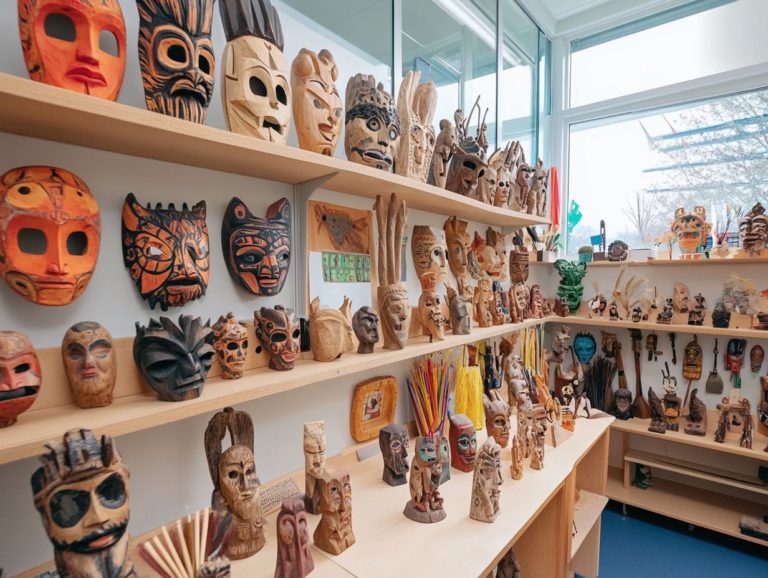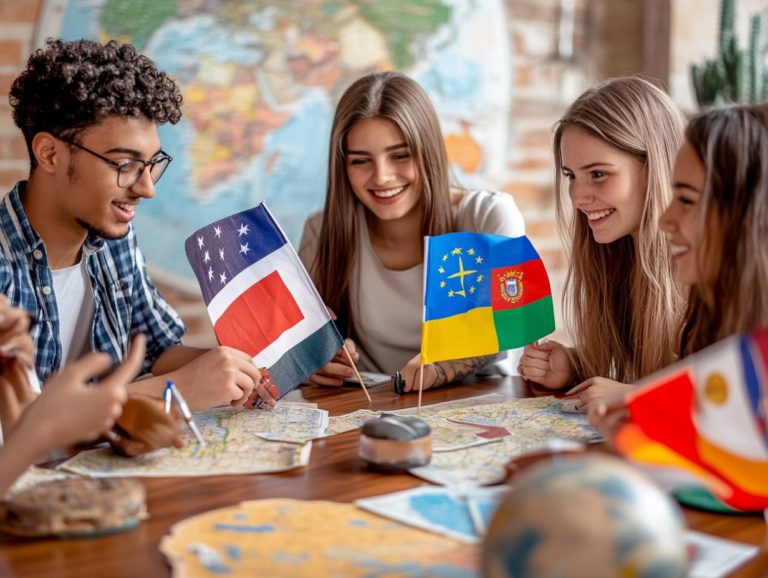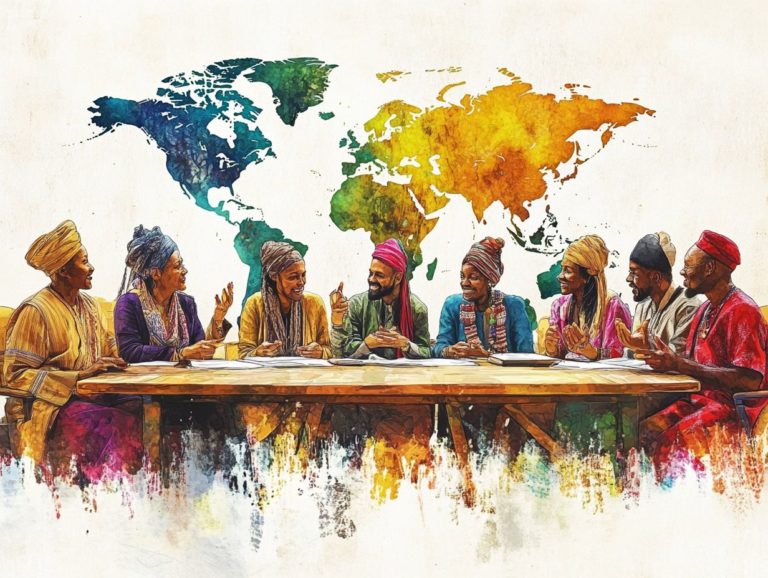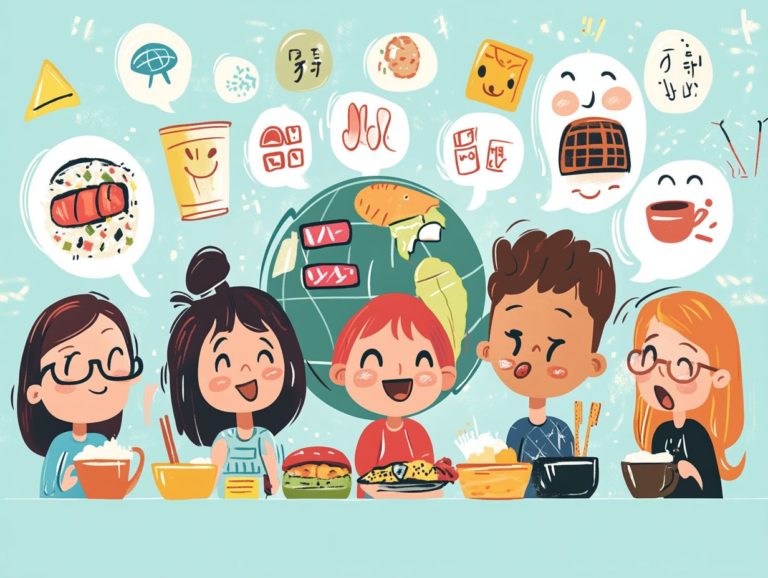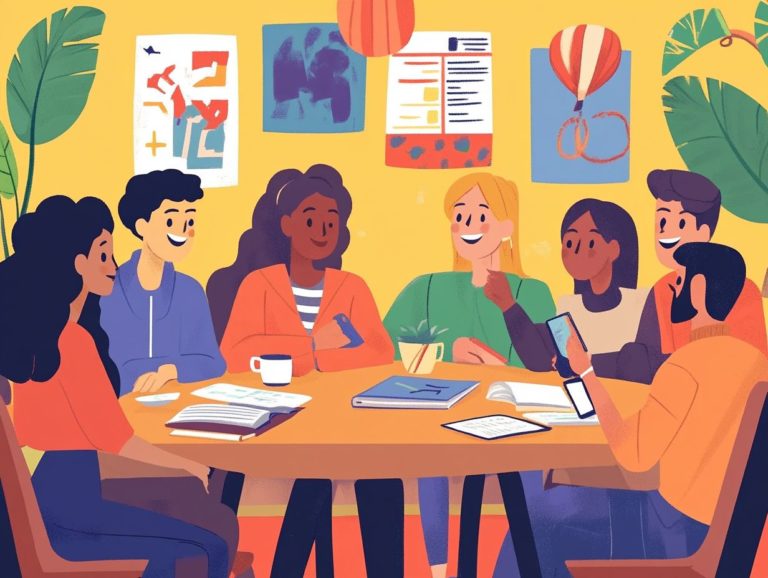5 festivals around the world for language learners
Festivals are vibrant celebrations that present you with a unique opportunity to dive deep into culture and community.
This article takes you on a journey through five exhilarating festivals from around the globe La Tomatina in Spain, Holi in India, Carnival in Brazil, Oktoberfest in Germany, and Chinese New Year in China.
Each festival not only showcases rich traditions but also offers invaluable linguistic advantages.
Attending these events can significantly enhance your language skills, provide cultural insights, and arm you with tips to maximize your experience.
Discover how immersing yourself in festivals can elevate your language learning journey to new heights.
Contents
- Key Takeaways:
- 1. La Tomatina Festival in Spain
- 2. Holi Festival in India
- 3. Carnival in Brazil
- 4. El Oktoberfest en Alemania
- 5. Chinese New Year in China
- Why Are Festivals Great for Language Learning?
- What Are the Cultural and Linguistic Benefits of Attending These Festivals?
- How Can Language Learners Make the Most of These Festivals?
- What Are Some Other Festivals That Can Be Beneficial for Language Learners?
- How Can Festivals Help Improve Language Skills Beyond Just Vocabulary?
- What Are the Potential Challenges of Attending Festivals for Language Learning?
Key Takeaways:
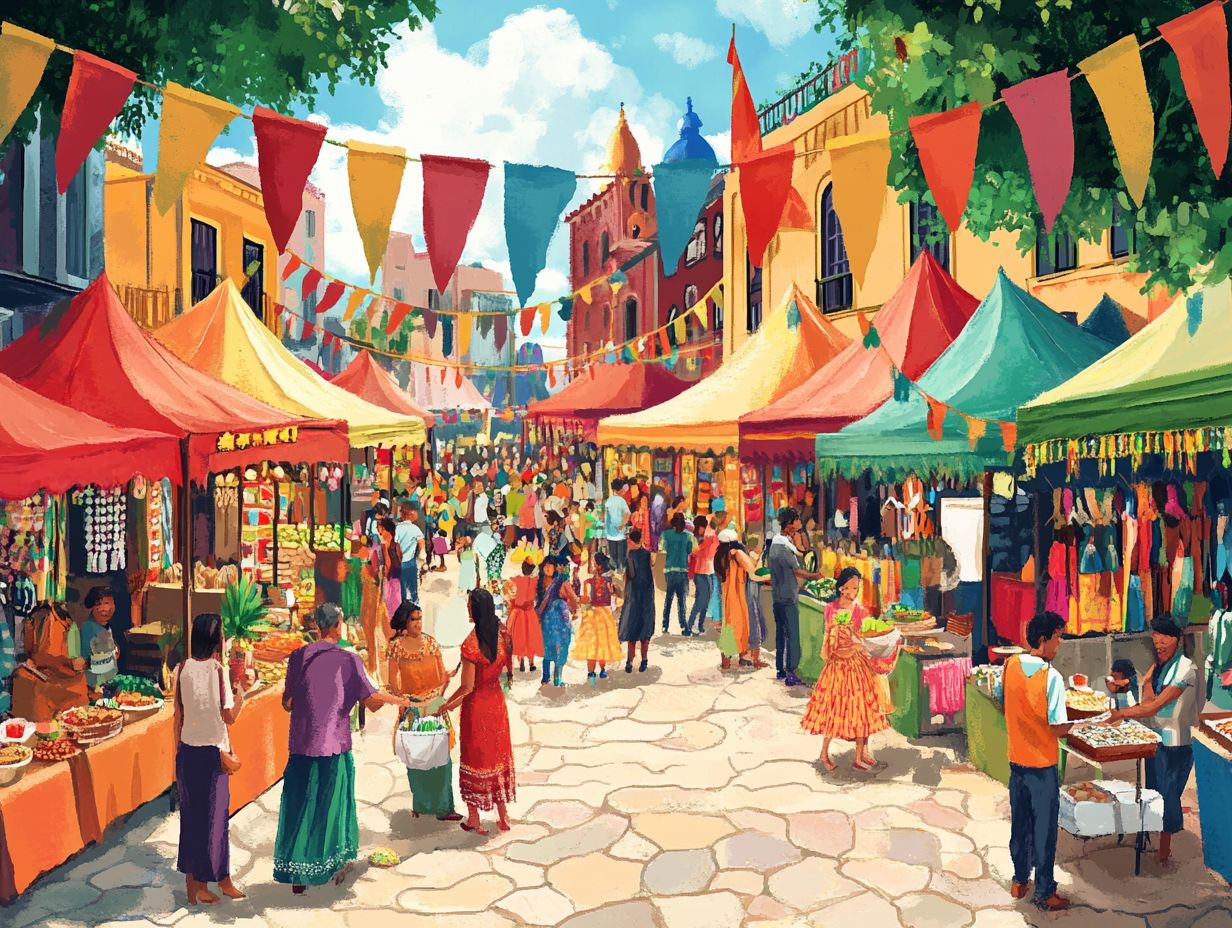
Immerse yourself in the Spanish language and culture at La Tomatina Festival in Spain.
Experience the vibrant colors and traditional language of India at the Holi Festival.
Join in on the celebrations and learn Portuguese at the Carnival in Brazil.
1. La Tomatina Festival in Spain
La Tomatina is a vibrant festival in Spain that beckons thousands to partake in an exhilarating tomato-throwing extravaganza. It fosters friendship, joy, and a rich appreciation for Spanish culture through its lively celebrations.
Originating in the quaint town of Bu ol in the late 1940s, this festival kicked off as a spontaneous food fight during a local parade. Over the years, it has blossomed into a globally celebrated event, attracting not just locals but also eager tourists from every corner of the world.
As you prepare to dive into this unforgettable experience, immerse yourself in the local customs. Enjoy traditional music, dance, and savor authentic Spanish cuisine before the legendary tomato battle begins.
This delightful blend of festivity and cultural appreciation entertains while enhancing your language skills. You can interact with locals, picking up valuable phrases and expressions amidst the laughter and flying tomatoes.
2. Holi Festival in India
The Holi Festival in India is a dazzling celebration that marks the arrival of spring and the victory of good over evil. It offers you a vibrant experience brimming with joy, unity, and an exceptional chance for language learning and cultural insight.
As the streets burst into a riot of colors, people joyfully toss powdered pigments, transforming the mundane into a stunning kaleidoscope. Traditional music fills the air, inviting you to dance and sing, crafting a lively atmosphere that resonates with pure happiness.
Delicious sweets and savory snacks are shared among friends and family, showing how warm and welcoming Indian people can be. By immersing yourself in these customs, you can enhance your communication skills while cultivating a deeper appreciation for the traditions that enrich the cultural tapestry.
Every moment is an exciting lesson waiting to happen!
3. Carnival in Brazil
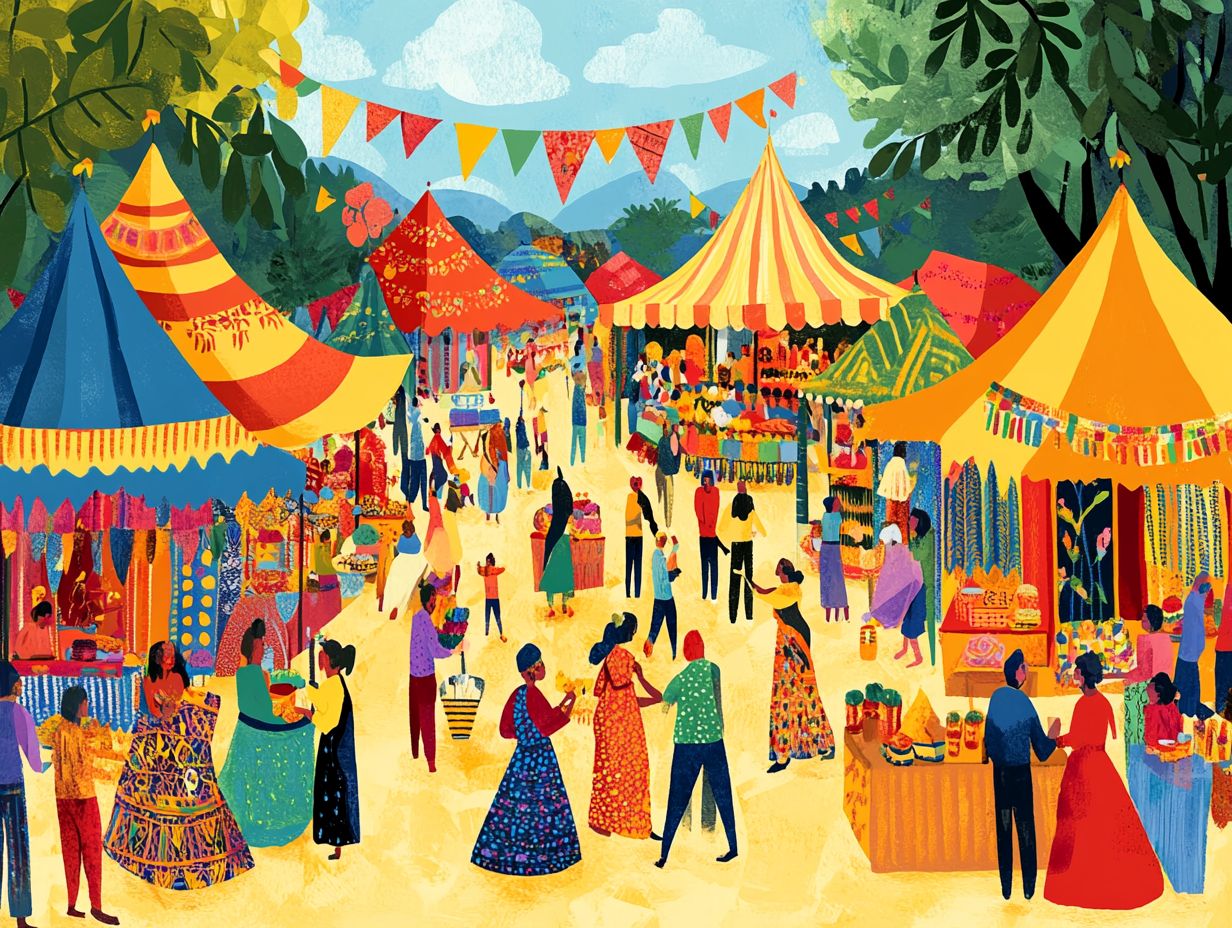
Carnaval en Brasil se erige como un festival de renombre mundial, celebrado con desfiles extravagantes, m sica de samba y trajes vibrantes. Ofrece una oportunidad inigualable para sumergirte en la cultura brasile a y explorar la rica tapestry de matices ling sticos y culturales que esta regi n tiene para ofrecer.
The festival brilliantly showcases the creativity of samba schools, which dedicate the entire year to preparing dazzling presentations. Imagine intricate floats, synchronized dancers, and elaborate costumes that narrate a captivating story.
Las fiestas callejeras, conocidas como ‘blocos’, invitan c lidamente tanto a locales como a turistas a unirse a la festividad. Aqu , competiciones de baile espont neas y cantos alegres fomentan un delicioso sentido de unidad.
A medida que participas en estas celebraciones animadas, absorber s naturalmente el idioma y las tradiciones de Brasil. Descubrir s un contexto l dico y significativo para el aprendizaje del idioma mientras te sumerges en su rica herencia a trav s de la m sica, el arte y las festividades comunitarias.
Don’t miss the chance to celebrate and learn! Immerse yourself in these festivals and explore 5 must-visit cultural institutions for language learners for an unforgettable language experience.
4. El Oktoberfest en Alemania
Imagine diving into the vibrant atmosphere of Oktoberfest! Es el festival de cerveza m s grande del mundo, atrayendo a millones que vienen a disfrutar de la cultura b vara. Aqu , podr s disfrutar de deliciosa comida, m sica animada y, por supuesto, cerveza excepcional.
Es una experiencia inmersiva que ofrece un vistazo al idioma alem n y una comprensi n m s profunda de la rica herencia de la naci n a trav s de sus vibrantes celebraciones.
Este evento anual tiene sus ra ces en 1810, cuando comenz como una celebraci n de boda real para el pr ncipe heredero Ludwig y la princesa Therese. A lo largo de los a os, se ha transformado en un espect culo global que subraya la importancia de la cerveza en la cultura alemana, donde cada bebida no solo sirve como bebida, sino como un testimonio de la artesan a y un sentido de comunidad.
Como asistente, puedes sumergirte por completo en la animada atm sfera, deleit ndote con danzas folcl ricas, disfrutando de actuaciones en vivo y participando en juegos tradicionales, todo mientras te mezclas con los locales. Este ambiente interactivo te permite no solo celebrar, sino tambi n aprender, aprendiendo frases y costumbres alemanas en el camino.
Tu experiencia se convierte no solo en festiva, sino educativa, cerrando brechas culturales y fomentando una apreciaci n aut ntica por las tradiciones consagradas de la regi n.
5. Chinese New Year in China
Chinese New Year is a grand festival celebrated throughout China, marked by joyful family reunions and traditional meals. These vibrant festivities allow you to gain a deeper understanding of Chinese culture, language, and the significance of this important celebration.
This festive season is overflowing with lively customs, from the exhilarating lion dances that symbolize strength and good fortune to the dazzling fireworks that illuminate the night sky, believed to ward off evil spirits.
Family traditions, such as visiting elders and exchanging red envelopes, not only foster connections but also convey heartfelt wishes for prosperity.
Embracing these traditions allows you to immerse yourself in the celebrations and engage in conversations that can significantly enhance your language skills. Participating in this cultural experience will inevitably cultivate a richer appreciation for the values and narratives that shape the Chinese community.
Why Are Festivals Great for Language Learning?
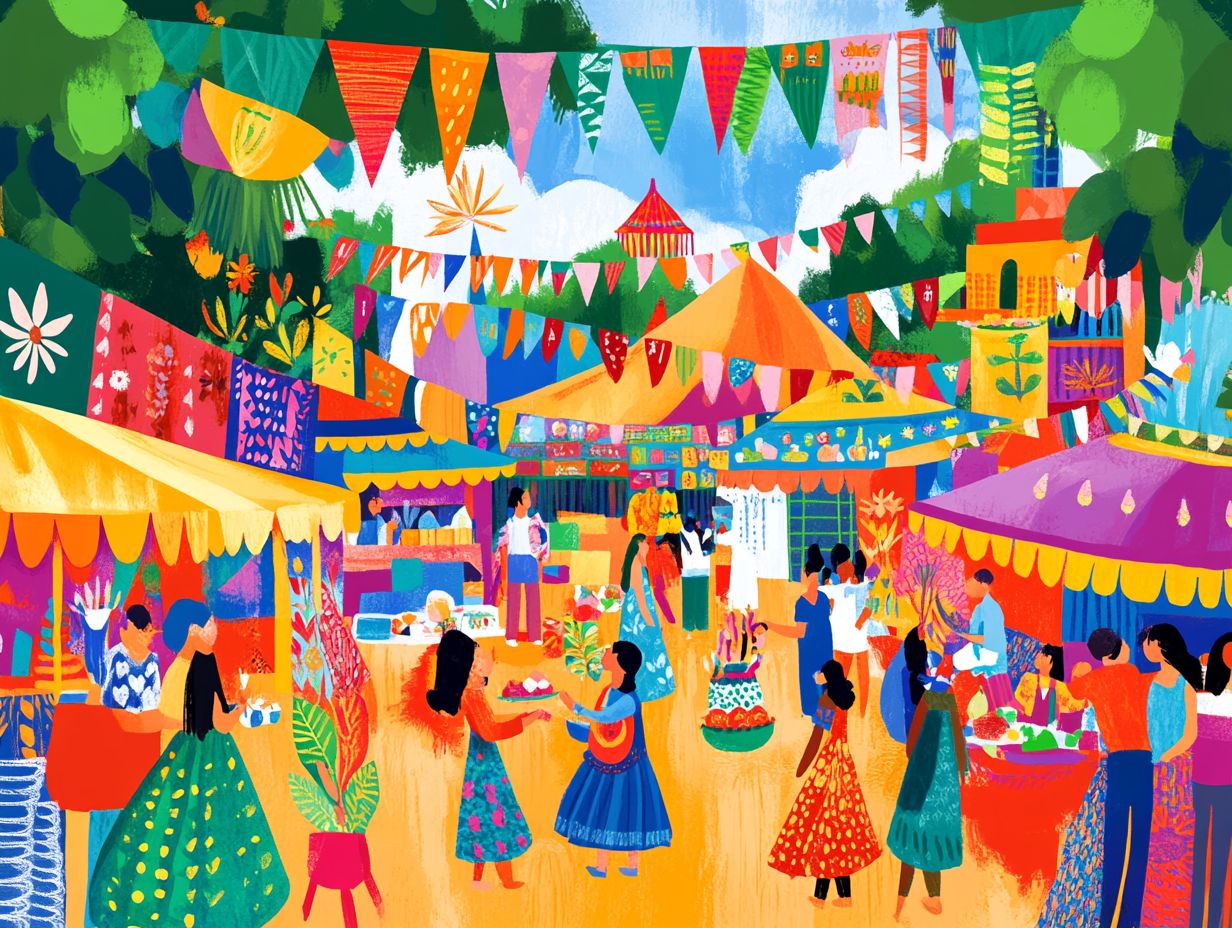
Cultural festivals offer many benefits, presenting exceptional opportunities for language learning and immersing you in authentic cultural experiences. These events promote social interaction and foster an appreciation for diverse cultures and languages through engaging celebrations.
By participating in these events, you engage in real-life conversations with native speakers, enhancing your pronunciation and vocabulary in a lively, dynamic setting.
You ll gain invaluable exposure to local dialects, significantly enriching your understanding of language nuances and variations.
The cultural context woven into festival activities think traditional music, dance, and culinary delights provides you with a deeper connection to the language, making it more meaningful and memorable.
This perfect blend of practical exposure and cultural immersion positions festivals as an ideal environment for honing your linguistic skills and building confidence in communication.
Join a festival near you and experience the joy of language learning firsthand!
What Are the Cultural and Linguistic Benefits of Attending These Festivals?
Attending cultural festivals offers you a wealth of benefits, particularly when it comes to enhancing your language learning. By immersing yourself in authentic dialogues, idiomatic expressions, and rich cultural contexts, you deepen your understanding of different cultures.
These immersive experiences allow you to engage with native speakers, fostering meaningful conversations that significantly enhance your linguistic comprehension. Take Diwali, for example the Festival of Lights in India. Here, you ll encounter traditional storytelling and folk music that beautifully illustrate the nuances of the Hindi language.
Similarly, Oktoberfest in Germany provides a fantastic opportunity to practice your conversational skills while savoring local cuisine and customs. Such experiences not only elevate your ability to communicate effectively but also cultivate empathy and appreciation for diverse perspectives.
As you navigate cultural differences through shared experiences, you expand your worldview in truly enriching ways.
How Can Language Learners Make the Most of These Festivals?
You can improve your language skills at cultural festivals. Engage with locals, join traditional activities, and practice your language in real settings.
Immerse yourself in the vibrant atmosphere to understand cultural nuances and unique phrases. Talking with native speakers makes you feel more confident and helps you grasp pronunciation better.
Participate in workshops, dance classes, or craft sessions to apply your skills meaningfully. Connect with others who share your interests!
Jot down unfamiliar words and phrases during events. This will give you valuable material to study and enhance your language journey.
What Are Some Other Festivals That Can Be Beneficial for Language Learners?

Many cultural festivals worldwide, like Dia de los Muertos in Mexico and Diwali in India, provide unique chances to dive into local culture while improving your language skills.
These lively celebrations not only boost your language abilities but also deepen your understanding of each community’s traditions. For example, Hanami in Japan celebrates cherry blossoms and offers insights into seasonal appreciation.
As a language enthusiast, approach native speakers with curiosity. Jot down new words and phrases you hear, making your learning enjoyable and impactful.
How Can Festivals Help Improve Language Skills Beyond Just Vocabulary?
Festivals can supercharge your language skills! They promote real interactions, improve listening skills, and deepen your appreciation for cultural expressions, as highlighted in celebrating global festivals: language and culture.
In these lively settings, you interact with native speakers and feel the flow of conversation. This exposure sharpens your understanding of local phrases and various accents.
Engage with the emotional stories shared at these events. This empathy towards different backgrounds is vital for fluent communication.
What Are the Potential Challenges of Attending Festivals for Language Learning?
Festivals can enrich your language learning experience. However, they come with challenges. You might encounter language barriers and cultural misunderstandings, along with the overwhelming nature of large crowds.
Don t let these hurdles scare you! They re just part of the adventure. Navigating these challenges can feel daunting, especially when you’re eager to engage with locals or immerse yourself in the festivities. The variety of languages can lead to confusion or even frustration, making it tricky to forge connections.
To tackle these obstacles, prepare by familiarizing yourself with key phrases and cultural norms ahead of time. Approaching fellow festival-goers with a friendly demeanor can open doors to spontaneous conversations, allowing you to practice in a vibrant context. This fosters meaningful exchanges that enrich your overall learning journey.
Frequently Asked Questions
What are some popular festivals around the world for language learners?
Some popular festivals include the International Festival of Language and Culture, the Polyglot Gathering, the Language Festival, the World Youth and Children’s Festival, and exploring cultural festivals for language learning.
What is the International Festival of Language and Culture?
The International Festival of Language and Culture (IFLC) is an annual event that brings together students from around the world to showcase their linguistic and cultural talents. It promotes peace, dialogue, and understanding among different cultures through the power of language and art.
How can attending the Polyglot Gathering benefit language learners?
The Polyglot Gathering is an international event that connects language enthusiasts to network, share knowledge, and participate in workshops and talks. Attending this festival can help you improve your skills, learn new languages, and connect with other learners and native speakers.
What is the Language Festival?
The Language Festival celebrates the diversity of languages and cultures around the world. It features language workshops, cultural activities, and performances by language learners and native speakers. It’s a great opportunity to immerse yourself in a new language and culture, as well as explore language learning through cultural festivals.
What is the World Youth and Children’s Festival?
The World Youth and Children’s Festival is a biennial event that brings together young people from various countries to celebrate diversity and promote global understanding. It features language and cultural workshops, performances, and activities, making it a valuable learning experience for language learners.
How can participating in the International Linguistic and Cultural Festival benefit language learners?
The International Linguistic and Cultural Festival provides a platform for students from different countries to showcase their talents. Participating can help you improve your skills, gain cultural knowledge, and build connections with other learners and native speakers.

